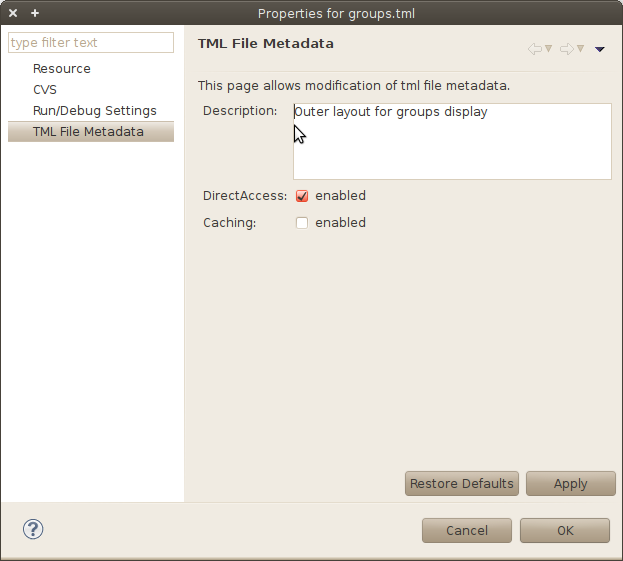OpenWGA 7.6 - OpenWGA Concepts and Features
Design and development » Design directoriesWebTML modules in folder "tml"
Folder "tml" holds definitions of WebTML modules.
Below this folder there are subfolders where each contains WebTML modules for a special media key. The media key of the contained modules is determined by the name of this media key folder.
WebTML modules are defined by module files with suffix ".tml", holding the WebTML code of the module. Their module name, which is needed when referencing them from WebTML, is just the file name without suffix. Just create new files with this suffix to create new WebTML modules (or use the "New... > WGA TML Module" functionality of OpenWGA developer studio".
WebTML modules may be organized in subfolders below their media key folder. The name of those subdirectory modules in WebTML consists of the name of subfolders plus the file name, again without suffix, all divided by colons ":". For example a module file stored inside:
tml/html/outerlayouts/releasenotes/standard.tml
Is referenced in OpenWGA design by this name
outerlayouts:releasenotes:standard
Note that neither the suffix ".tml" is part of the module name, nor is the type folder "/tml/html". Both just identify the file as WebTML module of media key "html". See Design References for more details on this addressing scheme.
A secial subdirectory named "metadata" may exist in each media key folder, even in subfolders. These hold metadata definitions for the WebTML modules in XML format. You should not edit these files manually but rather use the "Properties"-Dialog of each module file or the embedded controls to their editor to modify WebTML module metadata.
Metadata settings for WebTML modules
Beyond the code they hold there are more settings on WebTML modules that influence the way they are published. These settings are available in OpenWGA developer studio when you open the "Properties" of a WebTML module file (Right click on file -> Properties). In the properties window there is a section called "TML File Metadata".
This editor hosts the following settings:
Description
This is a simple description about the purpose of the module that is not interpreted by the OpenWGA server.
Direct Access
This checkbox controls if the WebTML module may be directly addressed via URL. The URL formats of OpenWGA allow to directly choose a WebTML module to be rendered, optionally in the context of any content document that the user has access for. But this will only be allowed for WebTML modules that have this option checked. All modules without direct access will only be rendered when specified as outer layout of some content type or when explicitly called inside by the application design itself, like with WebTML tag <tml:include>.
Direct Access and Security
WebTML modules that are allowed direct access may be a security threat for your application, especially if it contains data somewhere that should not be freely accessible but is not protected via OpenWGA's own access control mechanisms (like restricting access to the containing documents via their "Readers" field). Applications may choose to restrict access to this data by WebTML functionalities, for example by simply not displaying them on the templates.
For example: Document "x" hosts an item called "classified". The document has it's metadata field "Readers" unfilled because the document should generally be visible to anyone. Only the item "classified" should be shown only to special people. To accomplish this there is a WebTML condition on the page that will show the "classified" item only if the current user is contained in a special user group.
However if there is some "directly accessible" WebTML module named "leak" from any other part of the application that shows an item "classified" without testing the user - this may be meant for completely different documents - then it will be theoretically possible for anyone that has access to the document to render it with this module. So the item "classified" will be displayed for anyone.
To ensure a secure application you should:
- Only enable direct access for WebTML modules that really should be addressed directly via URL. (This does NOT include outer layouts as they really are addressed via the settings on content types)
- Ensure on these modules that you not accidentally display items that contain classfied information on some otherwise unprotected documents of your application
Caching
This checkbox is only effective when the WebTML module is either addressed directly via URL or being used as an outer layout. If checked it allows the users browser to cache the result of the whole WebTML page as long as the database of the main context does not change.
WebTML requests normally are not cacheable by the users browser. OpenWGA ensures this by sending HTTP headers that disallow browsers to put the page in the cache. The reason for this is the highly dynamic nature of a WebTML page. A page may produce differing results with each new request dependent on many conditions.
If your WebTML pages' dynamic parts are only dependent on the data of the addressed applications' content store then you may enable this flag to allow the browser to cache the page. On any subsequent request the browser will now ask the server if the page has changed since it was cached. The OpenWGA server will check if the content store data of the application has changed since this time. If so it will render the page anew and send the new results to the browser. If it hasn't changed it will merely give the browser a short "not modified" notice and the browser will show the page from the cache. This saves resources on the OpenWGA server (the page does not need to be re-rendered) and the network (the whole page does not need to be transferred again).
Be aware that OpenWGA will only check the data of the content store whose application was addressed, i.e. the application whose database key is in the URL. If your page is dependent on data from other databases you will not be able to enable this caching without unwanted effects.

